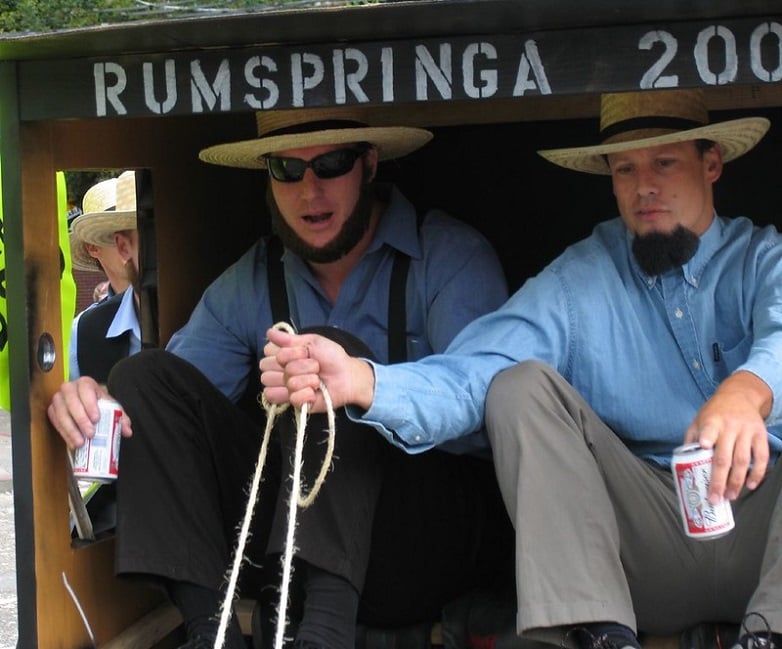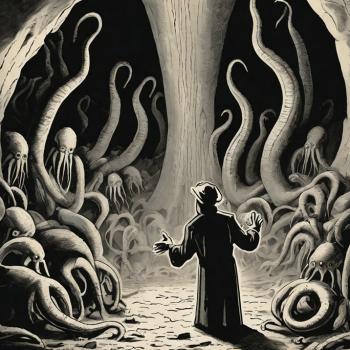If the conservative Amish encourage their young people to experiment and figure out what they truly believe, why are Evangelicals afraid of rumspringa for their own children?

What is Rumspringa?
According to NPR,
Rumspringa is a Pennsylvania Dutch term, usually translated as “running around” and derived in part from the German word Raum, which means “space” in the sense of outside or outdoors space, room to roam. “Running around outside the bounds” is a more complete translation.
It’s a time when the Amish encourage young adults to strike out on their own, live the way they’ve always wanted to, and decide whether or not they want to be baptized and join the Amish community. Popular TV shows and movies depict rumspringa as a time of wild debauchery. The English love to watch the freak show of the fearless ultra-conservative young people who are smoking and drinking for the first time. But rumspringa is more than just an experiment in sex, drugs, and rock ‘n’ roll. It’s a time for deconstruction. A time for developing minds to pull apart their religion, nail by nail and board by board. It is a time to inspect each aspect and decide their own faith and fate.
Why are Evangelicals Afraid of Rumspringa?
If the Amish encourage their young people to figure out their own faith or even leave it, why are Evangelicals afraid of rumspringa for their own children? Perhaps their fear of deconstruction represents a lack of faith in their own conservative message. The Amish are convinced that most of the young people will return. Yet, conservative Evangelicals seem terrified that the ways of the world are so powerful that their children will be lost forever. Perhaps Evangelicals need to embrace the parables of the lost and found.
Parables of the Lost and Found
Jesus’ parables of the misplaced sheep, coin, and child have one common denominator: all will be found. God seeks us out. Searches high and low until he finds us. God sweeps the house clean until she recovers us. Runs and embraces us, no matter how far we’ve traveled and regardless of what we’ve done. So, there’s no reason to fear rumspringa or faith deconstruction. Because God’s unconditional love will always find us.
Train Up a Child
This does not mean, however, that young people who leave the Church will always return. Conservative Evangelicals like to quote Proverbs 22:6 NKJV, which says, “Train up a child in the way he should go, and when he is old, he will not depart from it.” They like to think this means their prodigal children will return to the Church. Rather, it means that if you raise a child to value wisdom, love, truth, beauty, hope, and peace then they will likely become the kind of adults who cherish those things. It does not mean that they will always be loyal to the institution in which you raised them.
It doesn’t even mean that they will remain in the religion that you instilled in them from childhood. The value of rumspringa is that people get to decide for themselves what they believe. Your children may return from their deconstruction, reinvigorated by their time away and re-committed to the faith they inherited. Or they may never return, having found greater freedom in unrestricted thought and religious liberty. Either way, they will have decided for themselves rather than dutifully following their parents’ example or the church’s instruction.
Don’t Be Afraid of Deconstruction
When Amish people send their children on rumspringa, they aren’t worried that the world will seduce their children so far that they fall from grace. No—it’s not because they believe in eternal security. They actually believe that salvation is conditional upon obedience, like many conservative Evangelicals. It’s just that they have enough confidence in their religion, and in God, that they know things will work out. Conservative Evangelicals, likewise, should stop being afraid of deconstruction. If they trust God, then they should trust that God will work for the good of their children.
Falling from Grace
Why are Evangelicals Afraid of Rumspringa? The only reason we should fear deconstruction is if we believe it’s possible to fall from Grace. Yes, rumspringa would be a horrifying thing if it were possible to backslide so far that you could lose your salvation. But there’s a problem with the notion of falling from grace. That whole concept forgets what grace really is: the unmerited favor of God.
You can’t fall from grace, because you never earned it. Grace isn’t something we are good enough to deserve. Neither is it something we can be bad enough to lose. God gives grace because God is gracious. And I’ll tell you a secret. God gives grace to everyone.
Why are Evangelicals afraid of Rumspringa? The only thing to fear is that a person might lose their salvation – and that’s just bad theology. You can’t fall from grace, or else it isn’t grace. If deconstruction for Evangelicals is analogous to rumspringa, then Evangelicals should have nothing to worry about. They should know that deconstruction and reconstruction offer a pathway to figuring out what you really believe. Instead of feeling threatened by it, Church leaders should encourage it. Because, as we see in the parables of the misplaced sheep, coin, and child, God will eventually find everyone. No one is ever truly lost, for it’s impossible to leave God’s hands.
















